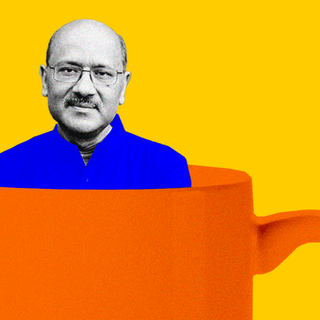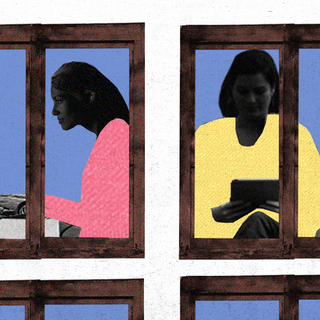
Why Stories About Filthy Rich People Fascinate Us
“It comes down to some mix of aspiration and disgust,” an expert noted.

There’s very little Succession’s Roy family has in common with most people. Falcon business jets and vacation yachts? Not your average day. Or The White Lotus’s guests vacationing in an exotic, five-star resort; CFO Nicole Mossbacher’s ideas sit in an alternative world. Even the sprawling extravagance in Crazy Rich Asians does little to connect with the average viewer. You know, with the wedding at Singapore’s Garden By the Bay and all.
Movies and shows have embraced the saga of the filthy rich as a regular offering. They showcase the lives of the 1% — a small ratio of people — whose grandeur, indulgence, and delusions are on full display. These tone-deaf and satirical narratives of people worrying about sex scandals or mansion renovations make for captivating television. This may have something to do with individual psychologies, consumer behavior, and, well, the allure of money.
At one level, it’s the desire to see vulnerability on screen. Take Succession’s Kendall Roy, the son under his father’s thumb. The German idea of schadenfreude explains people’s love to see others fail, but characters’ raw, human failings also help carve a soft spot. “That vulnerability might serve to connect these characters to audiences, who think, ‘Okay, they make mistakes like me so that I can be like them.’ It makes identifying with the characters easier,” Anthony Patino, an associate professor of marketing at the University of San Francisco, told Refiner29. How “real” the character influences how connected the viewer will feel; human flaws and inadequacies reaffirm the humanity of someone like Dynasty’s Fallon Carrington.
And by flaws, I mean something as relatable as heartbreaks or constantly disappointing your family. Inconsequential bets, scandals, dinner parties, and politics may be quite rightly in the territory of rich people problems; yet, they still make a laundry list of the many traits that define humans. The connection is some form of “parasocial relationships,” a one-sided attachment with characters or famous people. “When we care about someone ― even a celebrity ― they feel like an extension of ourselves. So, good things happening to them feels good and bad things happening to them feels bad,” Shira Gabriel, an associate professor of psychology at the University at Buffalo in the U.S., told HuffPost.
Stories of wealth and drama further tap into this connection by showing rags-to-riches stories. Jay Gatsby, for instance, comes from a poor farming family who makes his way into the world of wealth and throws extravagant parties. The lament of The Great Gatsby is one of money’s power and powerlessness. It could buy Jay Gatsby yellow Rolls-Royces and lovely, really nice shirts, but happiness and status remain wanting. And “rags” here doesn’t always have to do with poor backgrounds; the story arc could also be psychological or emotional wealth. One may find it rewarding to see Gossip Girl‘s Chuck Bass, who starts as the conventional spoilt rich kid, get a moral conscience as the show progresses.
“You can connect to characters on both a personal level — you see they exhibit similar traits to you — and because you wish you were living your life as they live theirs,” Patino added. The aspect of aspiration comes in a close second in fuelling this relationship further. Any viewing of Keeping Up With the Kardashians involves marveling at the three-acre property with two spas (because one is just inconvenient, you know) and a vineyard.
Related on The Swaddle:
Why We Feel Close to Celebrities We Have Never Met
Watching what people don’t have is cathartic. It gives a glimpse of what life could look like in a different reality. The sprawling houses, luxury cars, branded clothes are aspirational, giving people something to look forward to. “The wealthy have more ability to take action,” Rachel Davis Mersey, a professor of Journalism at Northwestern, told Highsnobiety. “If I am wealthy and there is a pothole outside of my building, I may be more likely to know more about who to contact to fix it, and I may even socialize with them. Celebrities are the quintessential access, and anyone will take their phone call.” Some experts also think the aspiration finds root in a correlation (even if flawed). The idea is that people who choose between gold-plated pizzas or space travel must be happy. The aspiration for wealth becomes an aspiration for happiness at once.
At the same time, they offer a psychological release for the average viewer. “I can set my problems and challenges aside for a moment to escape in an alternative world,” Mersey added.
The hate-watching also borders on love and inspiration. “It comes down to some mix of aspiration and disgust,” Cristel Russel, a marketing expert, noted. “We love to think we can aspire to have some of the nice lifestyles… But we also hate those people who can afford and to some extent waste things and be so conspicuous about it.” This also sets in motion negative beliefs about money; aphorisms like “money corrupts” or being born into a wealthy family makes you “aimless.”
Lastly, the allure and obsession with wealth may further serve as an encouragement to this obsession. Social “courtesy” would have people think talking about money is taboo; financial positions or troubles, or accepting the reality of what it takes to create a thriving lifestyle is hard, are conversations better swept under the carpet. “Money is taboo — we’re not supposed to talk about it. But what if these forms of entertainment get me and whomever I’m sitting with to open up the conversation?” explains financial therapist Sonya Britt-Lutter.
Who knew money, delusion, and drama would make for a riveting plot — one that could even be counted as a worthy satire. From vaunting ambition to emotional turmoil, there is a universality it latches on to.
“We’re not quite done witnessing the absurdity of tropical, vacation-interrupting Zoom meetings with China, $75,000 sorry-I-cheated bracelets, and paid-in-full, whirlwind nuptial regret,” Harper’s Bazaar argued.
Why? Because it doesn’t matter if these are fantasy, most of us will never know. As long as people who live these fantasies are like us, the rich people saga will pique our interest.
Saumya Kalia is an Associate Editor at The Swaddle. Her journalism and writing explore issues of social justice, digital sub-cultures, media ecosystem, literature, and memory as they cut across socio-cultural periods. You can reach her at @Saumya_Kalia.
Related


What We Lose When We Don’t Interact With Strangers
